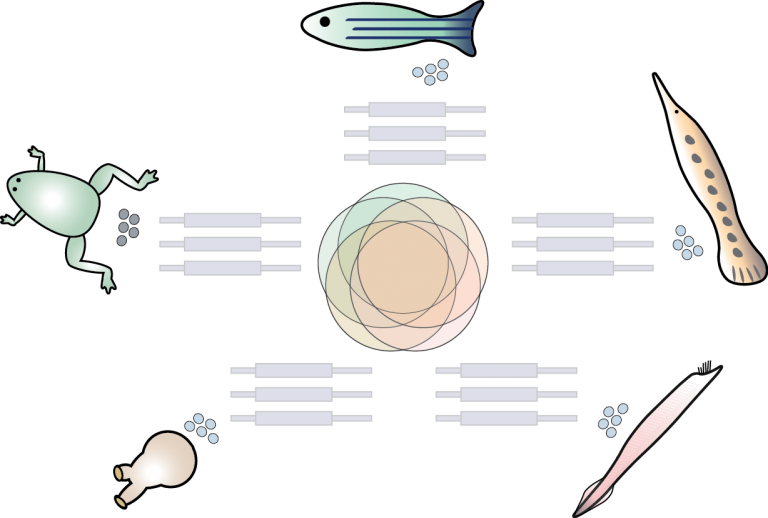
Contact
 Potential Ph.D. students interested in gene regulation, development, evo-devo and/or computational genomics are encouraged to apply here!
Potential Ph.D. students interested in gene regulation, development, evo-devo and/or computational genomics are encouraged to apply here!
For most animals and plants, the genetic instructions that guide early embryogenesis are inherited as RNA. During a short window of development, these RNA coordinate all cellular activity, including the processes that induce the first rounds of transcription from the embryonic genome. Eventually those maternally inherited RNA are destroyed, as newly transcribed embryonic RNA assume control of the embryo. This period of development is called the maternal-to-zygotic transition.
Maternally inherited RNA encode the instructions to reprogram an egg into pluripotent embryonic stem cells, the precursors to all cell types in the adult organism. We study eggs, embryos, and their RNA and genomes to better understand the mechanisms underlying cellular identity and pluripotency, and how they have evolved. Our tool kit includes genetics, embryology, and high-throughput experimental and computational genomics across animals, including (so far) zebrafish, Xenopus, and the cnidarian Hydractinia symbiolongicarpus.
- Matthew Hurton,
- Jayesh Kumar Sundaram, Graduate Student
- Tina Choi, Research Technician
<p>Phelps WA, Hurton MD, Ayers TN, Carlson AE, Ros
<p>Ayers TN, Nicotra ML, Lee MT. 2023. Parallels a
<p>Blatt P, Wong-Deyrup SW, McCarthy A, Breznak S,
<p>Phelps W, Carlson AE, Lee MT. 2021. Optimized d
Yartseva V, Takacs CM, Vejnar CE, Lee MT‡, Gira
Lee MT#, Bonneau AR#, Giraldez AJ‡. Zygotic gen
Lee MT#, Bonneau AR#, Takacs CM, Bazzini AB, Di
Bazzini AA#, Lee MT#, Giraldez AJ. 2012. Riboso
Pan-American Society for Evolutionary Developmental Biology Junior Faculty Award, 2024
Outstanding New Investigator – Int’l Xenopus Board, 2023
Basil O'Connor Scholar – March of Dimes, 2017-2019
